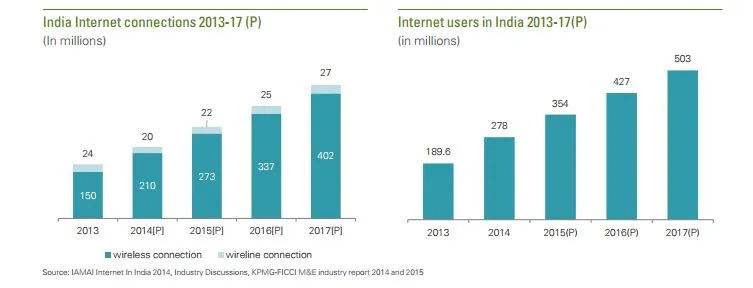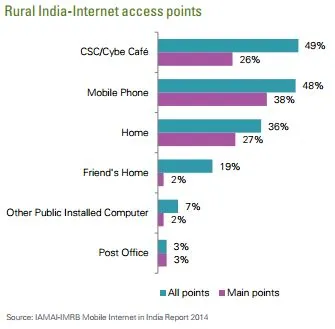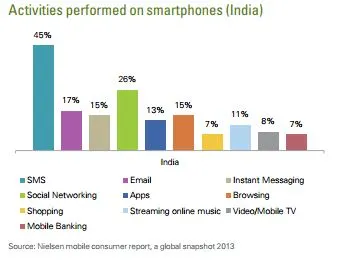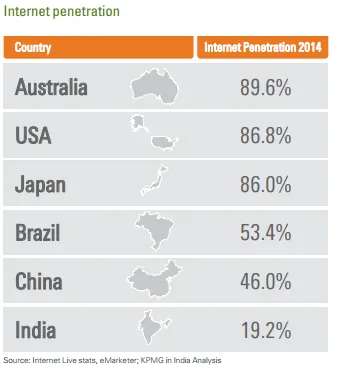With 3rd largest smartphone market in the world, India to reach 314 million mobile internet users by 2017
From 200 million internet users in 2013 to over 500 million internet users by 2017 -- including 314 million mobile internet users -- the growth story of mobile internet in India is on the upsurge.
A report by IAMAI and KPMG projected that India will reach 236 million mobile internet users by 2016, and 314 million by 2017. Earlier this year, Mary Meeker compared India’s internet penetration of 2014 with China of 2008 and the US of 1996. Here are some of the highlights from 'India on the go – Mobile Internet Vision Report 2015'.

3G and 4G user base to increase
The 2G user base in India is projected to decline in the coming years as more and more customers are expected to migrate from 2G to 3G. The 3G user base in India is rapidly gaining market and is projected to grow at a CAGR of 61.3% from 2013-17. There were approximately 82 million 3G subscribers in India by the end of 2014 and the number is projected to reach 284 million by end of year 2017.
To increase user adoption, several Telecom operators reduced their 3G tariffs by 80-90 per cent in the second half of the year 2013 and brought 3G prices comparable to 2G prices. As of June 2015, internet users in India stood at over 350 million. 4G user base is also expected to grow at an annual growth rate of 344 per cent and a CAGR of 103 per cent from 2013 to 2018.
Rural growth through 2G
The report h

as found that the rural growth story in the coming years will likely be through 2G technologies. 3G and 4G may continue to be primarily an urban phenomenon for the next few years. Increased internet enabled device penetration, decreasing handset prices and data plans tariffs are helping create a suitable environment for a rapid growth of mobile internet in India, with rural India set to take the lead. As of June 2014, nearly 50% of the Active Internet Users(AIU) in rural areas accessed internet using mobile phones, community service centers (CSC) and cyber cafes. 38% of the AIU use mobile phone as the main access point.As per the report, rural India is steadily moving towards a more internet friendly and exploratory mind-set. As of 2014, the Active Internet User (AIU) base in rural India was 6.7% of the overall rural population of 905 million and accounted for 61 million users. 4.4% of the total rural population used a mobile device to access the Internet compared to 0.4% in the year 2012.
The second wave of internet through mobile devices
India has the third largest Internet user base in the world out of which more than 50 per cent are mobile-only internet users. However, the Internet penetration in India at 19 per cent is quite low compared to other developed and developing economies.
In India, the number of people who own mobile phones is greater than the number who own personal computers. The Indian government is committed to setting up a robust digital infrastructure and to promote adoption of mobile Internet and related products and services. In 2014-15, the Government budgeted INR 500 crore for building infrastructure as per the National Rural Internet and Technology Mission with an additional INR 100 crore budgeted for improving e-governance.
Usage patterns

India is making the transition from features phones to smartphones rapidly. This is accelerated by the availability of low-cost smartphones and data plans. SMS, email, messaging and social networking apps are the most popular used apps, while video streaming and banking services are the least used apps. Customer’s apprehensions around security of payment platforms and data privacy need to be addressed.
Many handset manufacturers are making their contribution towards mobile internet growth by manufacturing affordable handsets supporting vernacular content. The median price of handsets has dropped significantly making internet enabled devices affordable for the masses. Several domestic handset manufacturers are contributing to the increasing trend of smartphone usage by selling high end phones at lower price points. The report found that smartphones seem to deliver a better user experience and have the potential to accelerate the adoption of mobile internet. India has become the third largest smartphone market in the world.
Solutions
Even the best content and app may not appeal to a user if the network backbone does not support the intended user experience. Development of infrastructure, deployment of high end network technology, small cells in congested and rural areas, central QoS body for off-deck content, supportive regulatory policies can lead to improved data connection and thereby better user experience.
Further, the ecosystem can reap benefits by creating standards for technology platforms. CrossPlatform, cross-device and cross-region compatible technology platforms could help in inter-operability between different systems and services possibly leading to delivery efficiency.
Feature image credit: Shutterstock
Related read: Internet growth, impacts and success: what will India be like with 550 million users in 2018?








